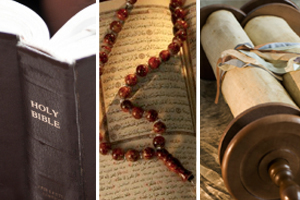Role of religious courts in US examined

Many religious groups in the United States have independent legal systems to address issues among the faithful - most notably the Catholic Church's internal handling of clergy sexual abuse claims.
Earlier in the week, the Pew Forum on Religion & Public Life released "Applying God's Law," an analysis of the role of religious courts in the United States.
But religious courts see to tens of thousands of less news-worthy legal issues each year, including civic and matrimonial disputes and in some cases - as the report notes - matters of deemed apostasy.
In Orthodox and Conservative Jewish communities, rabbinical courts oversee not only marriage and divorce, but also civil suits within the community.
In Muslim countries, sharia courts decide disputes and provide legal counsel in both civil matters and issues of religious law.
Sharia courts do not operate in the United States, but imams are available for consultation and legal service and they issue divorce decrees and settle child-custody issues for Muslims.
The Pew Forum found, however, that, with the exception of the Catholic Church, Christian ecclesial courts tend to deal less with civil and domestic issues and more with violations of their individual constitutions.
Denominations like the Evangelical Lutheran Church in America, the Episcopal Church and the Presbyterian Church, U.S.A. all have internal judicial systems to discipline clergy for violations such as extramarital affairs or financial misconduct.
Assemblies of God congregations are largely autonomous. Thus, while national and regional authorities handle situations of clergy misconduct, lay members are under the jurisdiction of their local church for disciplinary action.
The report found the Church of Jesus Christ of Latter-day Saints to be the Christian denomination with the most far-reaching jurisdiction. The church not only governs marriage and divorce, it also handles issues of criminal activity.
The most serious of cases are heard by the Stake High Council.
The president of the local church, known as the stake, and 12 other church leaders make up the council. Six of the men defend the "best interests of the church," or victims if applicable. Up to six men can speak on behalf of the accused.
Punishments for crimes range from temporary barring from certain church activities to dis-fellowship and excommunication.
The Southern Baptist Convention, the largest Protestant denomination in the United States, does not have an independent legal system.
